
Legal THE UK MAGAZINE FOR ALL WOMEN WORKING IN LAW | FEBRUARY 2023 Women she’s leaving home… � Refugees � Networking � Partnership Prospects ‘On unknown paths, yet never lost No longer growing roots but learning to drop anchor’


2 | LegalWomen Xxxxxxxxxxxxxxxxxxxxxx Don’t change what you do. Just make it easier to do. See how Clio makes legal practice management easier. Discover Clio today at clio.com/uk/legal-women or call +44-800-433-2546.
PUBLISHER Benham Publishing

Aintree Building, Aintree Way, Aintree Business Park, Liverpool L9 5AQ
Tel: 0151 236 4141
Fax: 0151 236 0440
Email: admin@benhampublishing.com
Web: www.benhampublishing.com
ACCOUNTS DIRECTOR
Joanne Casey
SALES MANAGER
Catherine McCarthy


STUDIO MANAGER
Lee Finney
MEDIA No.
1939
PUBLISHED
February 2023 © Legal Women Magazine, Benham Publishing Ltd.
LEGAL NOTICE
© Benham Publishing.
None of the editorial or photographs may be reproduced without prior written permission from the publishers. Benham Publishing would like to point out that all editorial comment and articles are the responsibility of the originators and may or may not reflect the opinions of Benham Publishing. No responsibility can be accepted for any inaccuracies that may occur, correct at time of going to press. Benham Publishing cannot be held responsible for any inaccuracies in web or email links supplied to us.
DISCLAIMER
Legal Women Magazine welcomes all persons eligible to join our community regardless of sex, race, religion, age or sexual orientation. All views expressed in this publication are the views of the individual writers and not those of Legal Women unless specifically stated to be otherwise. All statements as to the law are for discussion and should not be relied upon as an accurate statement of the law, are of a general nature and do not constitute advice in any particular case or circumstance. Members of the public should not seek to rely on anything published in this magazine in court but seek qualified legal advice.
COVER INFORMATION
See Foreword on Page 5 for details.
Editor-in-Chief: Coral Hill. Features
Editor: Molly Bellamy. Sub-editors: Gillian Fielden, Tilly Rubens, Joanne Skolnick.

Editorial Team: Amy Fullerton, Enya Hood, Charity Mafuba, Serena Reynell, Elizabeth Shimmell, Agnes Swiecka and Emma Webb. Researcher: David Smith. Photography Contributor: Leia Mackinnon.

LegalWomen | 3 Contents 5 Foreword 8 Ukranian lawyers living in the UK 11 Representing Refugees & Asylum Seekers 13 The Dentons Model 14 Madeleine Heggs 16 Navigating the partnership paradox 21 How to build a brand and network in 2023 22 Networking know-how 25 Barristers’ pay 26 Hidden Paralegals 27 The road less-travelled 29 Alternative careers in law 30 A gender perspective on international humanitarian law 32 Events 30 21 14 Find us online at: www.LegalWomen.org.uk
Deadline 28th April 2023 For the May 2023 edition Advertising Anyone wishing to advertise please contact Catherine McCarthy before the copy deadline. 0151 236 4141 catherine@benhampublishing.com Editorial To submit editorial, please send to: info@LegalWomen.org.uk
Copy
11

4 | LegalWomen Xxxxxxxxxxxxxxxxxxxxxx How’s the weather looking this working week? Cloudy, but brighter with MyQuill. Quill’s cloud-based legal software is chock-full of new and improved features, giving you everything your law firm needs to manage your cases, contacts, and bills in just a few clicks. The result? A clear workflow, and a clearer head, no matter the weather. SCHEDULE A DEMO TODAY! 0161 236 2910 sales@quill.co.uk quill.co.uk MONDAY TUESDAY WEDNESDAY THURSDAY FRIDAY
This issue of Legal Women attempts to acknowledge the sheer scale today of refugee and displaced people who have had to leave their home due to real adversity. Refugees, asylum seekers, economic migrants, forced migrants, trafficked people, men, women, children and unaccompanied minors, who experience profound displacement. The issue recognises the fragility of frameworks designed to protect, that often lead however to ‘push back’. It acknowledges the uneven sharing of responsibility by the international community to host refugees and displaced people.
Foreword
FEBRUARY 2023
This issue frames the uplifting stories of some refugee women, and other women who work to support them. All the artwork, photography and poetry featured in this magazine has been gifted to us by those refugees, asylum seekers and forced migrants listed below. ■
 Molly Bellamy
Molly Bellamy
We would like to give special thanks to the following contributors for their artwork, photography and poetry: ‘To Drop Anchor’ cover artwork by Elmira & Ramona Zadissa, photography by Abdul Saboor, ‘A Journey Away’ artwork by Aran Illingworth, ‘Broken Human Rights’ artwork by Senait Moges, ‘No Voice’ artwork by Masoumeh Jafari, ‘This Matter’ Poem by Haymanot, ‘Home’ Poem by Warsan Shire.
Cover Image Credit and Artist’s Bio: We, Elmira Zadissa (she/her) and Ramona Zadissa (they/them), were born into the same family in the SWANA region. By the proxy of social and political injustices and via routes of asylum-seeking, in our formable years, we ended up in the northern part of Scandinavia. A life path running along the margins has shaped our queer feminist, social and environmental activism. Today we acknowledge that we enjoy the privilege of being EU nationals in the post-Brexit hostile environment of the UK. We are interested in the points at which human characteristics overlap. Our practice seeks to uncover the stories and ideas that arise at these intersections.
LW magazine is for everyone; lawyers, solicitors, barristers, advocates, judges, legal executives and those working as paralegals, legal secretaries, advisers or recruiters, the list is endless. We welcome the many male champions as readers and contributors.
Our mission is to:
■ Provide clear information on gender parity
■ Inspire practical initiatives to create real change
■ Promote innovation in leadership and practice

LegalWomen | 5 Introduction
Image credit: Aran Illingworth
No one leaves home unless home is the mouth of a shark. – Warsan Shire
Enjoy a career without limits, earning up to 75% of your billing.
Taylor Rose MW is a top 60 law firm with over 30 offices nationwide and we are seeking legal professionals that are keen to work on a consultancy, fee sharing basis.
We are seeking likeminded individuals and groups of Solicitors, FCILEx or Licensed Conveyancers with 4 years PQE+ to join our consultant programme.
We provide lawyers with a unique opportunity to thrive as part of our consultant arrangement, taking back control of their life and earnings in a smart, modern and supportive environment.
You can choose to work from home, one of our offices or both!
Why choose us?
Earn up to 75% of what you bill; minimum earning 70%
Choose your own clients, fees, hours and volume of work
· Work from home, 100 days access to hot-desking facilities
PII cover up to £20 million
Free calls via our app
Access to nationwide offices and meeting rooms
Fully optimised CMS and electronic systems

Access to business development
Dedicated liaison team and technical head for ops, legal support and training
To find out more, read our brochure or arrange a confidential call, please email consultantrecruitment@taylor-rose.co.uk or visit our website
www.consultant-solicitor.co.uk
6 | LegalWomen Xxxxxxxxxxxxxxxxxxxxxx
“The ethos of the firm is progressive and forward thinking, always trying to benefit clients, staff and consutants. The move to Taylor Rose MW has been life enhancing.”
Felicity Marsden, Consultant Solicitor & Partner
Editorial Board
We are delighted to receive advice from the distinguished members of our Editorial Board. Full biographies are available on our website.

ENGLAND & WALES
Christina Blacklaws
Past Presdient of The Law Society of England and Wales. Christina is a multi-award winning published author, speaker and frequent media commentator on innovation and diversity and inclusion.
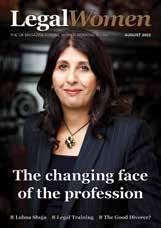
Millicent Grant QC (Hon) FCILEx
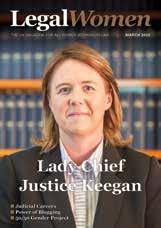
Millicent is a former President of the Chartered Institute of Legal Executives (2017/18) and currently a member of the Institute’s Appointments and Scrutiny Committee. Millicent has worked to tackle diversity and inclusion on the legal profession and judiciary, contributing to the Preapplication Judicial Education (PAJE) Programme. She is the only Chartered Legal Executive to be appointed an Honorary Queens Counsel. She is chair of the Knights Youth Centre, an independent youth work charity.
Janem Jones practised for many years as a partner and senior partner in a West Wales firm where she specialised in Family Law, Education Law and Criminal Law. She now works as a consultant for Williams and Bourne as an experienced advocate.
Sally Penni MBE is a barrister at Kenworthy’s Chambers, Manchester, whose practice encompasses Criminal (including Cyber Crime) and Employment Law. Sally is a Bencher at the Honorable Society of Gray’s Inn, Founder of Women in the Law UK and regular broadcaster of the highly acclaimed podcast.
NORTHERN IRELAND
Karen O’Leary leads Caldwell & Robinson’s Family Law practice. Qualified to practice in Northern Ireland, the Republic of Ireland, England, and Wales, Karen is regularly consulted by government and state agencies on legal matters from other jurisdictions. She is a Fellow of the International Academy of Family Lawyers (IAFL).
SCOTLAND
Alison Atack
Past President of The Law Society of Scotland. Formerly, Alison was a member of the Regulatory Committee and convener of the Client Protection Sub-Committee. She was a partner at Lindsays.
Volunteer positions at Legal Women
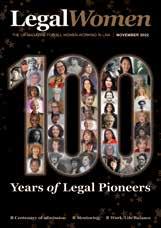
Currently, all of us are volunteers to get this publication going. If you would like to be involved in:
■ sourcing and checking copyright on images ■ working on events and following up funding opportunities ■ writing content for social media, blogs and magazine features
Feel free to email info@LegalWomen.org.uk with brief details about yourself. ■

LegalWomen | 7 Introduction
Nataliia Ukranian lawyer living in the UK

“One morning at 6am on the 24th February, I woke up and read the news that the war had started. I was shocked and scared and couldn’t understand what was happening… I woke up my daughter and told her ‘darling, you are not going to school because it is war – the war has started and I don’t know what we need to do, but we need to pack our luggage’. I left on 6th of March with my nine-year-old daughter and my sister-in-law.
There was a huge queue at our border and a lot of people they went abroad. So 90% of these people, they were women with children who were trying to save the children… me and my daughter and sister in law went by car to Latvia.
My sister-in-law and my brother had just got married on 22 February, 2 days before the war, my brother is a soldier in the army now and he’s fighting for our country, my husband and my parents… I have very lovely family and all of them, they’re staying in Ukraine now”.
Nataliia recounts how the two women and her daughter stayed in Latvia for one and a half months, but how she was concerned that, not knowing the language, she would not find work there. So she determined to leave. She knew some English and her daughter had been learning English since the age of 4. ‘Language is power’ she states with a smile. Friends introduced her to an English solicitor in London who became her sponsor.
“She helped for us to make all documents. And we, on 23rd of April, came to London. Yes. And it is like another step in our life… like ‘okay, we are safe’. But for me it was… I need to find job because how can I live here with my family without job? I knew exactly that I would like to be attorney, maybe not barrister or solicitor, but I would like to be lawyer, to work in my profession… and really I wasn’t very confident in this. I only had this very big goal that I need to work here, I need to try to do my best”.
Nataliia learned to write a CV, work with Linked-in, and study ESOL at the adult education College.
She posted on Facebook that she was a lawyer from Ukraine to see if there were others like her. “After 24 hours, I had connection with 150 Ukrainians. And after two weeks there were 350 Ukrainian attorneys who live in the full country and who has the same situation as me”.
From there, she set up the ‘Ukrainian Attorney in the UK network’. Nataliia recounts with thanks the support extended to her and other Ukrainian legals by the UK Legal Profession: individual sponsors who helped to make job applications and introductions; a networking event organised by the Law Society focusing on employment opportunities; an organised excursion for a group of Ukrainian legals to visit the Supreme Court and speak with one of the High Court Justices. And no less support from the corporate sector, in the form of sponsorship from Shell for 200 Ukrainian lawyers to take Legal English on-line courses.
“When I came here people were giving support for Ukraine…I feel this strong support for Ukraine”. However, she pinpoints, “for employers it is hard to understand how a Ukrainian lawyer can work here…” Nataliia was given a six-month contract by Shell to work as a contract coordinator, “I didn’t know anything about oil and products but I knew exactly what I needed to do with contracts…how to draft one…my knowledge from Ukraine was all there. In Ukraine, I had external clients from another country, like a two-country partnership, but here, for me…it’s like the whole world has opened, because we have a lot of business with many countries. After 6 months, I understood that the work was not so different, if you could do it in the little companies in Ukraine you can do the same here, except it is more open… you have bigger information, so you need an open mind – and to be brave!”
I ask Nataliia to say a little more about the network she set up.
“So I’m very proud of this because, for me I know exactly that Ukrainian people, they’re very professional. Yes. And we are very hard working. Because in Ukraine, you need to run very quickly if you would like to own money, if you would like to have clients, you need to be clever.…I see it as my volunteer role now, to help professional people find work…I think every person who will find the work, it’s very big success. ‘Cos it’s one more family will have a home and will live without stress here… they will know that they can be calm for the next 3, 4, 5 or six months. Because we only live like from something to something, from some action to another…. And for me now, I feel when I started my work in July I was so happy ‘cos I was thinking, great, I have six months of stability. It’s so important now. When my contract was reviewed, I was thinking, oh my God, I’m so happy again, because now I have six months of stability again and my daughter, she has stability too”.
Sustaining the networking role on top of a new job and looking after her daughter, cannot be easy I suggest.
“So sometime it’s very hard ‘cos every day you are living like in the two different lives, because you are here in London for safety, but your heart, your soul is in Ukraine because my family is in Ukraine… my brother, my cousins, all of them, they are soldiers and they have to fight”.
And her daughter?
“When she wakes up in the morning every time – we haven’t any problem about going to school… the head teacher said ‘we are so happy to have her at the school’… my daughter tells me ‘Mum I like Ukrainian language, it’s my native language –but I like English the same!’.”
What does she feel now on reflection?
At first, “we thought that the war will start, will finish after maybe two weeks, maybe three weeks. So we had very big hope that the war finished very quickly. But after two weeks I understood that no, I’m not right. And it’s long war. So I had to decide what I will do, what I can do, how can I help my country and my people”. ■
8 | LegalWomen Feature
Iuliia Ukranian lawyer living in the UK

Iuliia is a refugee and legal professional also from Ukraine. Like Nataliia, she left with her child, a boy of 11, to escape the war, “My story may be not easy, not difficult,” she says with humility… “I was writing a dissertation on immigration at the time… and wrote that when you move to a new country as an immigrant you go through 3 stages; the honeymoon stage, the frustration stage, the recovery stage….I had to skip the first 2 stages and begin with the recovery!”
Like Natallia, Iuliia networked within the field, being both a beneficiary of these emergent networks and a volunteer supporting other Ukrainian refugees. She too found work, as a litigation consultant. I asked her how she managed to apply her legal training from Ukraine to the UK context.
“So we have some differences between Ukrainian legal system and the UK…in Ukraine we have a labour code, in the UK you have employment rights act… in the Ukraine we use the highest court decisions, in the UK you use the common law like case law… it is more similar than we could realise. …I had a hearing in Scotland and the Scottish litigation process is very close to the Ukrainian one… so when I had my hearing I used the experience that I have from Ukraine… it was something that I could just transfer from Ukraine.”

I asked whether these ‘transferable skills’ were recognised by UK employers.
“I think the legal market is so big… and if employers realise that it is possible they may look at it from a different perspective… but we need to help the employers”.
How?
“You need to give lawyers here the same language that they use… so when you have a ‘specialist’ in Ukrainian, you put ‘consultant’… or when you have ‘main specialist’ in Ukrainian, you edit it to ‘senior associate’ – in this way people just see something familiar and they maybe understand more…”.
She laughs modestly at the simplicity of her logic so as to deflect any credit. I ask about her son.
“He’s 11… he told me that it is the best school ever... his favourite lesson is English!”.
Does she want to add anything, I ask.
“I hope my story will help somehow others, maybe someone who reads it will get some ideas from me… it’s really important for other refugees”.
And on reflection, I venture, has she completed the 3 steps to recovery…
“Well I began from the third, so I tried to cheat!”. ■
LegalWomen | 9 Feature
Image credit: Abdul Saboor
she’s leaving home…
The stories of Nataliia and Iiulia, women fleeing with children, is heartfelt; the role of the men remaining behind to fight sounds so commonplace, it jolts.

Such representations of the refugee in flight are deeply ingrained in our imagination, not least as this representation is firmly inscribed by Article 1 of the 1951 Refugee Convention, where a refugee is defined as having “a well founded fear of being persecuted,” and is construed in terms of a victim of circumstance passively fleeing. Such a connotation, though, precludes political and economic reasons for leaving a country, reasons that might be understood as a wilful rejection of a set of (adverse) conditions in the home country; where the leaving is more active than passive, ‘rejecting rather than fleeing’1. Suffice to say, that the representations we think we know are not value free, and the world has turned since 1951.
The 1951 Refugee Convention is a United Nations multilateral treaty which defines the terms by which someone can be considered a refugee, the rights of the asylum seeker and the responsibilities of nations towards asylum seekers within their jurisdiction. Its article of non-refoulement, enshrined in International Law, purposely delegates responsibility for refugee protection to state jurisdiction.
The inadequate definitions and lack of provision on responsibility-sharing of states has led to significant criticism of the Convention over the years. Contours have changed in relation to the ‘balance between security and liberty’2, and consistency in the way refugee status and legal allowances for refugees is determined across different States.
Today, of the 27 or so million refugees in the world, most are being hosted in neighbouring countries to their country of origin, countries which tend to be low to middle income countries, experiencing their own developmental challenges.
A second framework has been produced in the form of the Global Compass as a response to these changing contours. It is a mutual agreement adopted by the UN General Assembly and signed by 181 Member States, that came into force on 20th July 2018, with the aim of easing the burden placed on host countries, so as to ensure a fairer system of responsibility-sharing.
Scholarly engagement amongst academics, professionals in the field, activists and legal professionals, ensures a struggle over the terms of reference used to reconfigure the notion of refugee in ways that reflect reality today. As one academic argues, “categorizations create consequences…they entitle some to protection, rights and resources whilst simultaneously disentitling others.”3
A new progressive lens has emerged, however, in relation to this complexity, which understands asylum seeking and forced migration more in terms of something that emerges from a geopolitical and historical context, where wars don’t start and finish neatly, but where a continuum of conflict exists within states or countries and across our interconnected world.
From a legal perspective, the gaps that exist in the two key Refugee frameworks can be supplemented to some degree by Human Rights frameworks, whose “starting point is the fact of being human”4 not least in cases where refugee status is refused domestically. ■
10 | LegalWomen
Feature
Image credit: Abdul Saboor
Representing Refugees & Asylum Seekers
Iask refugee Lawyer Imogen Townley, who works for Wilsons in London, about the implication for refugees and asylum seekers of the proposed Bill of Rights that was introduced to parliament in June 2022 and has had a first reading. It would repeal and replace the UK Human Rights Act of 1998 which incorporates and makes the rights contained in the European Convention on Human Rights (ECHR) domestically enforceable.
Imogen: I think that the biggest loss would be the ability to hold public authorities to account. And that’s something that the most vulnerable in our society rely on a lot more than people who are in more stable positions. Those in stable, comfortable positions can go through their whole lives without ever needing to call on the High Court to assist them. And there’s many examples of litigation which has brought meaningful improvement for vulnerable people, and whole classes of vulnerable people. Those outcomes just won’t be possible if human rights are restricted and relegated to have less importance.
The government has been talking about restricting the powers of judges for a long time. Some in government seem to think that judges are interfering in things they shouldn’t interfere with, and that they’re using human rights to circumvent legislation. I would say that successive governments’ fascination with the idea of withdrawing from the Convention or repealing the Human Rights Act is bound up in a desire to limit judicial power. There is also a move towards restricting the kind of orders that can be made in litigation. That would limit the powers of the Courts in a different way, and the Courts are really concerned about that.
Molly: What issues do you see being played out in relation to the people you advocate for?
Imogen: There are increased delays across all types of immigration applications, including asylum applications. There are also delays in Refugee Family Reunion applications, which are applications that can only be made by a Sponsor who holds refugee status or another form of international protection. Often the family involved in these cases has already been affected by extremely long delays within the asylum process. The Sponsor is only able to make the application after maybe two, three years of waiting for status in the first place.
We are talking about extremely long cumulative delays. Within the family reunion process, the service standard – which is the time in which the Home Office aim to make a decision within – was last year increased from 12 weeks to 24 weeks. The Home Office is now routinely taking longer than the new service standards to make decisions.
When we chase for these decisions we are receiving responses along the lines of, ‘we cannot give a timeframe for your application to be decided in’. Often that is after two, three years of cumulative delay in the asylum claim of the Sponsor being dealt with.
Molly: What is the effect of these delays on the people you work with?
Imogen: Many Applicants find themselves just left in limbo. Often the lead Applicant will have significant caring responsibilities. It’s their responsibility to keep their children safe, to keep the show on the road, often in a dangerous place where the Sponsor has fled and gained asylum from. Applicants remain in the region and must wait lengthy periods. Often there’s no way that they can get their children into schools. They can’t settle. And the depressing effect is stark. The level of hopelessness is so obvious when you speak to Applicants who are deeply resourceful in their day-to-day life because they have to be, but are completely disempowered by the waiting process. It is very depressing.
The legacy of this extended period of uncertainty exists in the children’s prospects of succeeding in education, in learning a new language, and also in the relationships that Applicants and Sponsors have. There’s often resentment about the delays because of a feeling that there must be more that can be done.

Molly: What can you do as a lawyer in these cases?
Imogen: We can bring challenges to the delay relying on the client’s personal particular circumstances. We can put forward evidence that an Applicant is in danger, which is implied to be relevant to prioritisation within the family reunion policy document, and we can put forward evidence of other particularly detrimental impacts that delay is having.
Unfortunately even then, the responses we’ve been routinely getting are brief, generic and inadequate. The decision making teams’ position is basically, ‘we acknowledge the delay. We cannot give a timeframe’. Our clients are supposed to rationalise this approach as reasonable. Although we do sometimes instruct doctors to comment on the psychological impact this approach has on people, it’s hard to capture the impact in evidence. The assessing doctor isn’t there at the point that the client is advised of and is trying to make sense of these very brief responses, which basically say, ‘we don’t care’
As the delays become more egregious and systemic, we are also developing arguments which challenge the failures within the system. I have been arguing that the fact that the policy doesn’t give more detail of what should be considered to be relevant when deciding which applications to prioritise is unlawful. The argument is that there’s a duty on the Secretary of State to make clear policy on which applications should be prioritised. At the moment there isn’t a working process by which people with urgent circumstances can have their cases looked at urgently, which I think is in breach of implied policy intentions.
We are also thinking about challenging the impact of these delays under the Equality Act. �
LegalWomen | 11 Feature
Imogen Townley
The delays in these administrative processes affect different groups of people differently. In Refugee Family Reunion applications, Sponsors and Applicants are affected differently, and we are exploring arguments that inadequate consideration has been given to that.
Molly: Can you give an example?
Imogen: In the family reunion context it helps to think about who forms the Sponsor group, and who forms the Applicant group. There is a lack of safe and legal routes to the UK. It’s stating the obvious that those who make dangerous journeys here are taking huge personal risks, and it is also obvious that within family units decisions will be taken that the stronger, more able members of the family will be the ones who embark on the journey. In many families units, fathers and husbands make the journey alone, leaving behind their children and female partners. Once settled with refugee status, Sponsors can then apply for refugee family reunion and re-unite with immediate (that is, partners and children only) family members. This results is that a high proportion of refugee family reunion Applicants are women and children, and delays are affecting them disproportionately.
Molly: Yes of course. Can you tell us a bit about your work in relation to human trafficking and forced marriage?
Imogen: The definition of trafficking is technical; to be recognised as a victim of trafficking a person needs to show that they have been the subject of an action, by use of a means, for the purposes of exploitation. Often ‘for the purpose of exploitation’ will involve the extraction of a form of labour, but not always.
Forced marriage often, but not always, involves extraction of a form of labour. The forms of labour most typically required from those subject to forced marriage is provision of sexual services and domestic servitude.

I’ve been working on an argument that forced marriage alone amounts to exploitation, even without any labour being extracted within the role, simply due to its transactional nature.
Molly: And what difference does challenging the definition of forced marriage make?
Imogen: For clients who have been forced into labour within a forced marriage, the distinction makes no difference, as they stand to be recognised as victims of trafficking based on the exploitation of their labour. But for a woman forced into a marriage which did not involve exploitation of her labour, recognition that forced marriage alone constitutes exploitation is necessary for recognition as a victim of trafficking.
Molly: I see. In much of what you have said, the nuance at stake is to do with challenging or circumventing the policy language, as the effect is that it can enable or block access for the client. What challenges do you meet personally as the advocate of women in forced marriages.
Imogen: It is necessary to be mindful of the different perspectives on forced marriage that my clients have and question my own assumptions. For example, I have a client seeking asylum on the basis of a fear of forced marriage at the moment. Whether forced marriage is acceptable or not is something that she questioned a lot before claiming asylum and instructing me. We are now working together on the basis that it’s not okay, it’s not normal, it’s not acceptable, and it’s not something that she can accept. But although she came to me with that position already formed, I have to be aware that that was a difficult place for her to reach. That involved a personal struggle. Her mother and her sisters are in such
marriages, which she had fled, and they didn’t have abnormal lives in her mind, that was the norm. It is important as this client’s representative to acknowledge that she is coming to our discussions from a completely different perspective to my own. To ensure that her voice is faithfully represented it’s necessary to question my own assumptions constantly.
Molly: Thank you Imogen. What an insight into the creative litigation strategies that you and your colleagues deploy on behalf of the refugee and asylum seeking and forced migration community, who are lucky to find this kind of advocacy and innovation.
‘Language is power’ says Nataliia, and we glean through the narratives of the two Ukrainian women the ways in which a diaspora community works creatively to support its homeland; we witness too how refugee lawyers like Imogen challenge the policy maker’s language on their own terms via creative litigation strategies; and we celebrate how the refugee, asylum seeker, and forced migrant artists and poets who contributed their work to this issue ‘speak back’ so creatively in an increasingly hostile climate. ■
Molly Bellamy
Source: The Guardian courtesy of Christies.
References:
1. Achiume, E Tendayi (2017) Reimagining International Law for Global Migration: Migration as Decolonisation’ 111 AJIL unbound pp 142-146, p145.
2. Basaran, T. Security Law Borders: Spaces of Exclusion (2008) International Political Sociology 2,pp 339-354, p1.
3. Crawley, H. and Skleparis, D. (2018) Refugees, Migrants, neither, both – categorical fetism and the politics of bounding in Europe’s migrant crisis Journal of Ethnic and Migration Studies. Vol.44:1 pp 48-64, p 59.
4. Harvey, C. (2015) Time for Reform? Refugees Asylum -seekers and Protection under International Human Rights Law. Refugee Survey Quarterly Vol.30 pp 43-60, p 44.
12 | LegalWomen Feature
Artist: Masoumeh Jafari.
Romana BrudererSchwab
The Dentons Model
In this edition we hear from Dentons on its understanding of affinity groups, the importance of recognising inclusion, diversity and equity work through e.g. allowances of billable hours and its ABC model.
Studies have shown for a while now that women and people from other underrepresented groups are often penalized for engaging in diversity-valuing behaviour in the workplace.1 "Diversityvaluing" behaviour can be anything from mentoring a more junior colleague, to speaking at an internal Black History Month event, to being a member of the organisation’s women’s Affinity Group. Not only are women and people from other underrepresented groups often not rewarded when they participate in these activities, they are often actively penalised for their efforts.2
This state of affairs is compounded by a tendency to place the responsibility for solving the challenge of underrepresentation on members of underrepresented groups, further burdening them with “extra work” which their majority group colleagues are not expected to take on.
With this as the backdrop, it is critical for law firms to actively promote and reward diversity-valuing behaviour— such as contributions to inclusion, diversity and equity-related (ID&E) activities as part of performance expectations and recognizing contributions in compensation processes. For example, in many of our regions at Dentons, we have policies that support billable hours for engaging in ID&E at the firm.
To mitigate against the tendency to overburden women and colleagues from other underrepresented groups, at Dentons we are explicit in stating that it is the firm’s responsibility to drive greater ID&E in the places where we live and work.
At the same time, we also understand that Affinity Groups have an important role to play in helping us advance our objectives in a way that is meaningful for our people. They also provide crucial avenues for connection, unity and contribute to a sense of belonging.
As such, we use an "ABC" Model to guide us in defining how Affinity Groups contribute to our shared commitment and effort, while ensuring that we do not place the burden of responsibility for progressing ID&E on our women and people from other underrepresented groups. Rather, that responsibility lies with: (1) the firm; (2) full-time colleagues, like me, who work in the ID&E team; and (3) all firm members who, through demonstrating allyship in the workplace, drive inclusion every day.
Dentons Women is Dentons’ firmwide women’s Affinity Group. The group is made up of the leaders of our Regional Dentons Women groups from across the firm and is led by our Global Inclusion & Diversity Officer. Like all our Affinity Groups, the Global Dentons Women Affinity Group raises awareness, advocates for positive change and functions to ensure we have the right priorities and are building effective strategies to meet those priorities. Dentons Women also creates a space for belonging and connections.
In our monthly conversations with the Global Dentons Women group, we identified sponsorship as critical to driving career opportunities and advancement at Dentons. With those discussions in mind, our Global ID&E team designed and developed Dentons’ first Global Women’s Sponsorship Program, a pilot program for high-achieving women partners across the world to broaden their business networks, build critical relationships and realise the benefits of our global firm. We leveraged the ABC model with our Global Dentons Women group throughout all stages of development of the pilot program. The ID&E team led on implementation and worked to gain support for the programme. The Global Dentons Women Affinity Group provided guidance and support throughout, ensuring that the programme was addressing the right need and would yield meaningful results.
We recognise that we still have a long way to go to achieve our ID&E goals. Our ABC Model seeks to reinforce and embed ID&E-valuing behaviour across Dentons and ensure that we are not overburdening our colleagues; instead, assigning those responsibilities to everyone across the firm. ■
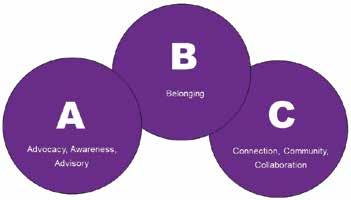
Romana Bruderer-Schwab Global Inclusion & Diversity Manager Dentons
1. Johnson, S. K, Hekman, D. R. March 23, 2016, Women and Minorities are Penalized for Promoting Diversity, Harvard Business Review. Available at: https://hbr.org/2016/03/womenand-minorities-are-penalized-for-promoting-diversity
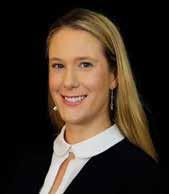
LegalWomen | 13 Affinity Groups
2. Ibid.
Madeleine Heggs
As part of the 100-year anniversary since women were first admitted as solicitors, Tilly Rubens met with Madeleine Heggs, whose successful legal and judicial career spanning over 50 years, shows how far women solicitors have come.
Madeleine Heggs arrives immaculately turned out, on a cold and wet November day, in a sharp suit defying her 92 years. She was born in 1929, only a year after all women had been given the vote in 1928, to the sound of Bow Bells. Madeleine’s father was Italian and with a Swiss-French mother, she was brought up speaking three languages with her two brothers.
It was a comfortable home in London but her early years were blighted by ill-health. “I was in bed for a year with whooping cough and pneumonia and then in a wheelchair for a year,” she recalls when she was five. This was at a time when such conditions were often life-threatening but with great stoicism, Madeleine made a full recovery and started school which she loved.
However, two years later, in 1939, Madeleine’s world was turned upside down with the start of the Second World War. Like many London children, Madeleine was evacuated, and was sent with her brothers to Blandford Forum in Dorset. It was difficult being away from her family although she enjoyed certain freedoms denied a city child such as “jumping around Stonehenge on as Sunday afternoon”.
Tragically her father was killed less than a year later, leaving the family in a desperate financial situation. Madeleine’s mother had never worked although, very unusually for the time, had studied for a degree in Lausanne. As a single mother, she “taught classics and took in lodgers” to support the family and Madeleine’s school granted her a bursary so she could complete her education.
It was a school where girls were only expected to become secretaries, or at best teachers, but as an early sign of her independence and determination, Madeleine decided this was not enough and she would study medicine. However not coming from a medical family and at a time when there was still a lot of prejudice against women becoming doctors, she chose instead to embark on a legal career as her older brother was already studying law.
She attended law school at Lancaster Gate but as the only girl in her year, found the experience “very lonely as you need other girls to go out with”. She was successful in passing her law exams first time and gaining articles which was no mean feat when at the time, less than 2% of women were solicitors. She also met her future husband at law school, and they married in March 1953.
Her husband got a bursary to study at Yale and they left London for the States to embark on a new adventure with “all their belongings packed in just two suitcases”. Madeleine managed to get work in the US as a legal researcher while her husband studied and, after living for a time there, the couple returned to London, where Madeleine qualified as a solicitor in 1955.
She worked for a year in Central London doing conveyancing work as the only qualified woman solicitor in the firm. “There was enormous prejudice towards women lawyers” she says and an assumption that women would not return to work if they had children. After Madeleine’s first son was born in March 1957, she took the very bold and financially risky decision to set up on her own and worked from her kitchen table in Ealing. Madeleine says that it was finances and the practicalities of looking after her son that persuaded her to do so.
Four years later, Madeleine had her daughter and then her younger son. She looked after all three children while working full-time with some help from her mother. Work came her way on the recommendation of some local banks and also from parents at her children’s school “While waiting at the school gates, the parents would come and find me to seek legal advice. I think I must have acted for half the parents at the school over time!”.
Over the next twenty years, Madeleine built up a successful practice dealing with residential and commercial conveyancing and probate. She enjoyed the work, but it was hard juggling a full-time career with childcare and says: “If I’d had the money to go to cocktail parties, I would have done!” Her life changed dramatically in 1975, when out the blue she received an “official looking” letter asking if she would become chairman of the local National Insurance Tribunal.
She jumped at the chance and heard appeals involving sickness and employment benefits. Initially Madeleine combined running her own practice with sitting locally in Ealing but when required to sit more often in Central London, her overall workload became too much and quite stressful. Some of the cases were also high profile including 350 of the printers who were made redundant when Rupert Murdoch moved production for his News International from Fleet Street to a new plant in Wapping.
In 1981, her legal career took a further upward trajectory, when she was appointed as a Social Security Commissioner – they heard appeals on question of law from the first-tier social security tribunals. As the first woman and first practising solicitor ever to be appointed as a Commissioner, this was momentous and a very exciting time for Madeleine. “We had the newspaper people out in the garden when I was appointed!” she recalls.

14 | LegalWomen Profile
Madeleine Heggs
If I’d had the money to go to cocktail parties, I would have done.
We had the newspaper people out in the garden when I was appointed!
Image credit: Leia Mackinnon
Madeleine says the other commissioners, all male QCs or benchers, were very kind and real, old-fashioned gents to her as a suburban female solicitor. “They would hold the door open for me and then take me out for lunch.” Madeleine remained the only female commissioner for 16 years and found the work very interesting.
She does not feel she treated cases any differently because she was a woman but occasionally did bring a different perspective to her male colleagues. For example, one case involved a widow who had got into significant debt and needed to repay a substantial amount of benefits which she had wrongly claimed. Madeleine decided the widow should only pay back half the amount she owed due to her impoverished circumstances.
She worked full-time for 21 years as a Commissioner until she retired aged 73. Madeleine says she loved the work as she was interested in people and enjoyed the intricacies of social security and employment law. “It was very well organised, intellectually stimulating and you got all the papers beforehand. It was lovely,” she recalls.
She still misses the buzz, company and intellectual stimulation of law since she retired but loves the excitement of living in London. She ensures she gets out whatever the weather and meets someone for lunch every day and then makes a date to meet them in six weeks so there is always something to look forward to.
Since Madeleine first qualified almost seventy years ago, the world of law has changed dramatically with women now making up more than half of new entrants to the solicitor’s profession and greater numbers of women solicitors than ever sitting as judges. As I walk away from our interview, it is clear that Madeleine’s sheer determination and willingness to take on new challenges should be a real inspiration and encouragement to the younger generation of women solicitors as they forge ahead with their careers in this centenary year. ■
Tilly Rubens Legal Consultant at Russell-Cooke LLP
The new legal competitive advantage
What should law firms prioritise as we move toward 2023? As new research from legal software provider Clio reveals, the answer above all else is adaptability. Ever-evolving working habits, new client expectations, and challenging market conditions mean that standing still in today’s landscape is the same as going backwards.
Clio’s brand-new Legal Trends Report shows just how profound an impact this constant change is having on law firms. It also highlights how firms can make themselves adaptable (and even antifragile) by adopting legal technology. The right solutions will allow law firms to meet both their clients’ and staff’s expectations –which will play a key role in helping law firms survive in what may be turbulent times ahead.

Why firms must adapt to lawyers’ changing working habits
The pandemic forever changed how lawyers want to work. Indeed, the 2022 Legal Trends Report shows that:
� 44% of lawyers are more likely to want to work throughout the day rather than a traditional 9-to-5 schedule
� 45% prefer meeting clients virtually
� 49% of lawyers say they prefer to work from home
Client expectations also continue to change
While firms must increasingly cater to their lawyers’ working preferences (especially if they want to keep hold of top talent), client demands are also a paramount concern. The Legal Trends Report found that:
� 35% of clients prefer virtual meetings, compared to 28% who prefer meeting in person
� 70% of consumers want the option to pay a lawyer via a payment plan
� 68% want to communicate with their lawyers over the weekend
The solution? Cloud-based legal software
Cloud-based legal software plays a vital role when it comes to law firm adaptability. These tools enable seamless virtual collaboration between law firm colleagues, and between lawyers and their clients. They automate administrative work – meaning no more precious hours wasted on low-value tasks. In fact, Clio’s research shows that the impact of legal software extends beyond helping lawyers fulfil their work commitments.
Lawyers using cloud-based legal software to manage their practice were:
� 60% more likely to have positive relationships with their clients
� 44% more likely to have positive relationships with colleagues
� 29% more likely to be happy with their professional life
These findings are just a snippet of those contained in Clio’s in-depth 2022 Legal Trends Report, the seventh iteration of this industry-leading publication. Based on aggregated and anonymised data from tens of thousands as well as surveys of thousands of legal professionals and consumers, it highlights some of the most pressing issues facing law firms today.
Get your free copy at clio.com/uk/LTR-women �
LegalWomen | 15 Profile
Navigating the partnership paradox
The path to partnership (P2P) is often cloaked in secrecy, leaving some lawyers feeling powerless to take control over their promotion prospects. So how can you persuade partners you’re ready for promotion, or that you have the potential to become a brilliant partner?
Whatever stage you’re at in your career, here are the three vital elements to planning your P2P.
1. Work out your timetable to promotion
I’m a big fan of the Stephen Covey approach of starting with the end in mind. Work backwards from the date partners are promoted, through the various stages of assessment, development and nomination.
At 8 PQE, if partners at your firm are generally only promoted post 10 PQE, you have a 2-year runway. If you’re 6 PQE, you may have 3 or 4 years in which to position yourself for promotion.
Planning backwards help you to work out when your sponsors need to start speaking up on your behalf to ensure that you are nominated for the P2P process. Do you need to get a place on a development programme? If so, how often are these run, and who has the ultimate say over who attends?
Who prepares the business case for your promotion? Often this will be you, even if officially it’s the responsibility of your team partners. What information needs to go into your proposal? How long (or short) does it need to be? Is there a template? When does it need to be submitted?
Top tip #1: Speak to partners who have just been made up. They won’t have forgotten yet the hoops they had to jump through.
Top tip #2: Work backwards from your target promotion date and put milestone dates into your P2P strategy timeline. Diarise career conversations with your partners.
Top tip #3: Signal your desire to go for promotion. Your partners aren’t mindreaders – tell them you’d like to be considered for partnership and ask them when you can realistically expect to be put forward assuming there’s a business case.
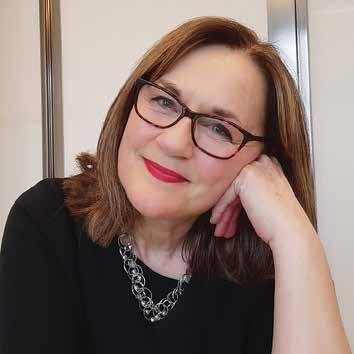
2. Demonstrate that your skills, knowledge, experience, and attitude match those expected of partners at your firm Whether you feel ready for partnership or not, are you clear on how to meet the expectations of a partner generally and at your firm specifically? It’s vital to get feedback on how you’re performing so that you know whether there are any gaps. However, to get meaningful feedback, you need to know what you’re being measured against. This can be tricky because firms often keep partner competencies and expectations close to their chest.
I find that the greatest gap in understanding is how partners are the owners of a business. They always have at least one eye on finance, productivity, delivering value and managing risk. Several of the partners I have coached have been surprised by just how much management information they have to get their head around from Day 1 of their promotion. Developing your awareness and skill of how law firms and business more generally operate is essential.
Top tip #4: Gather evidence of how you’re performing against the firm’s competency framework for senior lawyers (taking on responsibility, using initiative). Note down your wins, keep a file of client and other feedback, log your professional development. To paraphrase management guru Peter Drucker, you can’t showcase what you can’t measure.
Top tip #5: Get partners to open up about their transition to partnership. Ask questions such as, “What surprised you about becoming a partner?”, “What changes did you have to make to the way you work?”, and “How did the firm’s expectations of you change when you were made up?”
Top tip #6: Ask for targeted feedback. Frame your request so partners know exactly what feedback you’re looking for. E.g. “What specifically should I focus on to bring my CRM skills up to partner level?” Identify the skill you want them to comment on and make sure their feedback identifies the behaviours you can do more of.
Top tip #7: Develop your internal network to expand your reach among partners who don’t yet know you. The more people you can get speaking up on your behalf, the better.
16 | LegalWomen Smart Working
Paula McMullan
I find that the greatest gap in understanding is how partners are the owners of a business
3. Developing the mindset and resilience to carry you through There’s little doubt that the path to partnership is demanding and you may be on it for several years. How will you keep motivated? How will you nurture your self-belief?
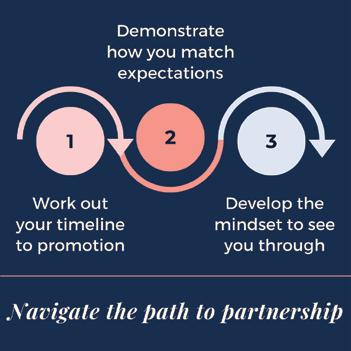

The key is to cultivate an abundance mindset, one which looks for opportunities and sees potential, and is comfortable with (or at least can cope with) change and uncertainty. If you focus on your limitations and mistakes, find it difficult to trust and experience negative thought patterns, your scarcity mindset will prevent you seeking out and seizing opportunities. It will also affect your resilience, making it harder for you to bounce back from stressful events.
Top tip #8: Focus on what you can control. If you’re not made up, it may well have nothing to do with you. The economic situation, the firm’s financial performance and your department’s relative standing within the firm are all factors which play into whether a lawyer is made up. Put your energy into actions you can take to develop your brand, network and potential.
Top tip #9: Develop different career options – pre-empt different scenarios. You’re not nominated or you don’t get made up, be ready with your business case for another firm and/or have a strategy for moving in-house.
Top tip #10: Surround yourself with people you look up to. Entrepreneur Jim Rohm says, “We are the average of the 5 people we spend most time around.” Who in your entourage lifts you up and inspires you? Who holds you back and keeps you small? And who is just motoring and not challenging themselves? Find situations and people who challenge you, and be curious.
Remember, it’s your career. If, despite your efforts, your potential is not recognised and your progress is not supported, it’s probably time to evaluate your options. But don’t expect partners to know you’re ready for partnership, or to appreciate your ambition automatically. It’s never too early to take steps to position yourself for promotion. ■
Career Coach for Lawyers, helping lawyers at a crossroads to secure their next promotion, land their next opportunity and make an impact in their new role. www.PaulaMcmullan.com
LegalWomen | 17 Smart Working
Paula McMullan
Legal Women|
LW Likes
carve her name... | @CarveHerName
#WOMENSART
Landscape with Hidden Moon' by Scottish artist Victoria Crowe.

Liberating Histories| @LibHistories
The distributor PDC (Publications Distribution Cooperative), crucial to the circulation of radical publications like Spare Rib, Camerawork and Women's Voice in the 1970s, now has a Wikipedia page!

https://en.wikipedia.org/wiki/Publications_Distribution_ Cooperative
#OnThisDay, 29 Jan 1891, Lili ‘uokalani is sworn in as Queen of Ko Hawai ‘i Pae ‘Ãina (the Hawaiian Kingdom). She was the first, and only, queen. She was deposed in a coup in 1893 that was supported by US marines and ultimately led to Hawaii’s annexation by the US. #WomenInHistory
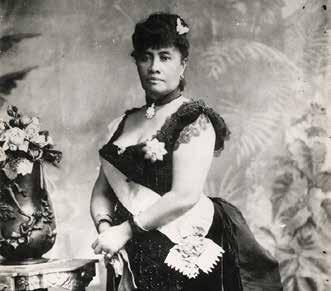
anita anand | @tweeter_anita

Couldn’t share the news with you before, but Princess Sophia Duleep Singh will finally get the recognition she deserves. Six new blue plaques have been granted for 2023. The Princess, suffragette and revolutionary will have her plaque on her grace and favour home at Hampton Court.
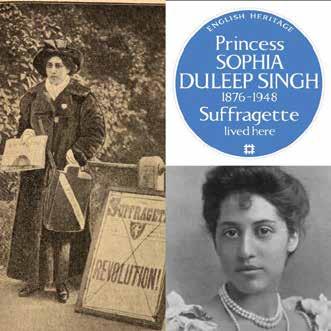
18 | LegalWomen LW Likes
@LegalWomenUK
The myth of “St Jacinda”. OK but being the first world leader in history to take maternity leave is … awesome!
@womensart1
#WomensArt
NETFLIX
LW | Recommends
Women at War
The latest Netflix series attracting attention is Women at War (Les Combattants). The creators are Cécile Lorne and Camille Treiner and in this lavish production they develop the stories of four women during the First World War, a sex worker, a nun, a nurse, and the head of a factory. It’s set in France and Belgium and shows how the lives of the women progress on the home front and interweave while the men are away at war.

BOOK
Until Proven Innocent
By Nicola Williams
This gripping crime story follows on from Without Prejudice using the same central character, Lee Mitchell, a young barrister from a working-class Caribbean background.

The plot concerns the 15-yearold son of the pastor who is shot in South London, leaving his parents and the local community shattered. The evidence points to a corrupt, racist police officer, Sergeant Jack Lambert, who demands that he is represented by Lee Mitchell. This is the last case the barrister wants to take on, as it overlaps uncomfortably with her personal life. Lee Mitchell grew up in the same area of South London and knows many of the people affected by the shooting, her mother even attends the same church where the pastor preaches.
Against her will, Lee does end up working as his defence barrister which puts her at the centre of the distrust in the community with 'Black Lives Matter!' echoing in the streets. Lee is left having to explain herself to her mother and boyfriend. The blurring between her personal and professional life raises moral dilemmas but Lee is determined to apply herself to the work unflinchingly despite what appears to be an indefensible act.
The characters and twists in the story make for a great read and for lawyers, it is a brilliant relief, that the author, as a barrister herself, has complete insight into the world of law so the crime thriller proceeds, without any gaffes, which can spoil a story when the author is not completely familiar with legal proceedings.
PODCAST/ AUDIO
The Guilty Feminist
The comedian Deborah Frances-White has been inundated with awards for her work. As well as podcasts, there is a book and live shows. She hosts podcasts with world class guests and discusses activism, ideas that “all 21st century feminists agree on” but are honest about insecurities etc that can underlie principles. It shows how talk can create real change or is its own blurb says ‘This is the show that proves you don’t have to be perfect to be a force for meaningful change.’

The Light We Carry
BBC Sounds has an audio version of The Light We Carry written and read by Michelle Obama. It gives her insights and strategies for living in today’s uncertain world, highlighting the value of friendship and how she navigated this when she was thrust into the role as First Lady. One chapter deals with overcoming the feeling of being different or not belonging. She also talks about the now famous refrain ‘Going High’ and what that means to her.

EVENT
International Women’s Day
Celebrating International Women’s Day on 8th March often extends into the whole month as there are so many events. The theme for 2023 is #EmbraceEquality. This emphasizes the role of male allies in recognising and involving themselves in the issues. Allies are incredibly important for the social, economic, cultural, and political advancement of women. Forging gender equity shouldn’t be limited to women solely working towards this goal. So holding an event at your workplace for everyone to attend is worthwhile so that it is clear how much it helps if a workplace is united in in recognising and addressing the problem. We can all challenge gender stereotypes, call out discrimination and draw attention to bias. Workplace events dedicated to this can create a space for views on the work policies to aired. Acting collectively drives change throughout society and enables us all to embrace equity
You can find out more here – IWD: International Women's Day 2023 campaign theme: #EmbraceEquity (internationalwomensday.com)

LegalWomen | 19 LW Recommends
Six things to consider when buying legal software
As a leading supplier of legal accounts and practice management software in the UK, Quill’s Executive Chairman Julian Bryan advises on the primary considerations during the software procurement process. Julian’s knowledgeable insights ensure a smooth transition, a good fit for your firm and long-term success. Read on to discover how following these six steps can help your software purchasing to deliver efficiencies, growth and compliance at your legal practice.
Your software significantly affects your short- and long-term performance and profitability. It’s the difference between success and failure. With so much hinging on it, we recommend you focus on these six primary considerations during the buying process:
1. Accessibility
Post-Covid hybrid working is standard. Your staff should have the ability to access your systems from anywhere, at any time, on any device. The opportunity to perform case actions and log chargeable time must be ever present.
Software that can facilitate this by sitting in the cloud and being accessible through internet log-in is therefore a must. The addition of a smartphone app is a nice touch as it further simplifies the use of multiple devices.
2. Security
The cloud has its sceptics, primarily for reasons relating to security. You possess sensitive data, confidential documents and valuable client monies. These must be safeguarded always.
Check out your preferred supplier’s security credentials and your favoured software’s security controls – ISO certifications, Cyber Essentials accreditation, encryption protocols, user permissions, server and backup measures, BCDR plans, password protection with multifactor authentication among them.
3. Cost and scalability
Consider what you need from your software on day one and what you might need in the future. You only want to pay for what you use. There’s nothing worse than paying for an overengineered system with functionality that you hardly touch.
Look out for a system that can grow with your own firm’s expansion into new areas of law. Being able to switch on and only pay for new modules as you need them is key.
4. Exit plan and exportability
Having an exit strategy is a prerequisite to signing and sealing your contract. Not only do
you need to ascertain the minimum contract term and notice period, but you need to ensure you can easily get your data back in a suitable format and your old supplier subsequently permanently deletes that data.
In GDPR terms, your software provider is your ‘data processor’ but you remain the ‘data controller’. This means that you have significant responsibilities for the ongoing control of your data – your financial records, your client details, correspondence and associated documents. Make sure you understand the exit process and any reasonable service costs for obtaining your data on exit.
5. Integration and modularity
As your base layer, choose software that natively contains practice management and legal accounting tools. These are the bedrocks upon which your business is built. You could get terribly confused if you have client and office transactions in separate systems, leading to a real chance of financial error and possible breach.
From this substratum, add any modular boosts or third-party specialist systems for particular functions as needed. Tight API integration with these modules saves time, prevents duplication and maintains data integrity.
6. Supplier culture
Not strictly software related, but no less important, are the culture, ethics and heritage of the company supplying the software. Is there a good match with your own? With commonalities, there’s a greater chance of forging long-lasting relationships, human being to human being, with integrity and honesty at the core.
You never know at the outset just how much you’ll be in contact with your supplier once implementation is complete. When these contact points happen, you want a pleasant experience with a mutually satisfactory resolution to any issues raised. Make sure you can talk to a person when you need to. It makes sense to meet the key staff and make it your mission to get to know them before you commit.
Further reading
Quill’s ‘Six things to consider when buying legal software’ article was featured in the ‘Law Society Gazette’ earlier in 2022. Further software buying tips are available in Quill’s ‘Legal Practice Management Software Buyer’s Guide’ giving you the tools to navigate the minefield of choosing the right provider and best software for your business. Download at: www.quill.co.uk/resources/legal-practicemanagement-software-buyers-guide ■
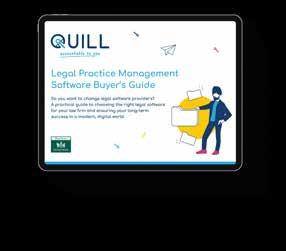
How to buy legal practice management software

20 | LegalWomen Advertisement Feature
guide to navigating the minefield of
suppliers Learn more: www.quill.co.uk/ resources/legal-practicemanagement-software-buyers-guide/
switching software
How to build a brand and network in 2023
Eileen Donaghey
Kicking off the new year with a bang, Legal Women and I hosted a webinar on the above topic. Unsurprisingly, there was a lot of interest as the new year jolts many of us into thinking about our brand and goals for the year ahead. When talking about building a brand and network the immediate place to start would be discussing tactics, such as attending certain events or posting on LinkedIn. Or so you would think. Below, I outline how I think you should be approaching the new year and building a network with clear steps.
1. Personal brand
Put simply, a personal brand is what you’re know for. Think of it as how someone would describe you if you weren’t in the room. What’s your profession? What are you like to work for?
What’s your niche? You get the idea. To build up a network and reputation you must first think about how you want to portray yourself. This is relevant for any stage of your career and important to really drill down what you offer and how you can help clients. Whether you are new in your career or more established, this is still a useful exercise to complete.
■ Headline sentence: A short snappy statement that sums you up.
■ Secondary sentence: A follow up which goes into a bit more detail about your work.
■ Final sentence: Something personal about you which shows off a little bit of your character.
N.B You can update the final sentence a few times a year depending on what it is.
Example personal brand statement:
■ Jane is an employment lawyer who loves to represent retail brands

■ She has a particular interest in discrimination cases.
■ Jane enjoys living in London and is training for the marathon.
Putting together a statement like this will help focus you for the next step which is goal setting.
2. Goal setting
Your time is precious so instead of attending networking events willy-nilly, you must be crystal clear on what you’re trying to achieve. Any activity taking you away from your kids/dog/partner/ hobby/Netflix must be leading to something. That’s why setting your goals and intentions are a must so that your strategy can flow from them.
Examples of goals:
1. Win a particular client
2. Hit your fee earning target
3. Have a better work life balance
4. Feature your work in the press
Whatever it may be, being clear on these goals will influence your strategy and how you spend your time in 2023.
3. Tactics
This is really deciding on how you will achieve these goals, what resource you need and setting a time frame. If you want to win a particular type of client, then you need to map out what the problems are for this client and where is the best place to message them. I have listed below a number of different tactics available. It’s up to you to decide what is best to suit your goals:
■ Social media activity: any of the platforms, LinkedIn, Tiktok, Instagram, Youtube
■ Face to face meetings with prospective clients
■ Email marketing
■ Press
■ Speaking or networking at events
■ Online adverts
■ Online articles
The possible list of marketing tactics is long but that doesn’t mean you have to do everything. Thinking about who you want to target to help achieve your goals, ask yourself what events they attend, how they network and where they get their information. If live events are out of the question, then it makes sense to focus on online.
There is a resource sheet to help you map out your 2023 goals which you can find here: https://www.canva.com/design/ DAFYejMRYGE/hBydCbheKff3nNHG46Rtqw/edit?utm_ content=DAFYejMRYGE&utm_campaign=designshare&utm_ medium=link2&utm_source=sharebutton. Good luck! Do connect with me on LinkedIn to learn more: Eileen Donaghey | LinkedIn ■
 Eileen Donaghey Consultant Donaghey and Chance
Eileen Donaghey Consultant Donaghey and Chance
LegalWomen | 21 Smart Working
Networking know-how
There’s often a dread of networking and a misunderstanding of what it involves. Anyone can network, from a student to the most senior member of staff, regardless of their personal preferences for social interactions. The important thing is to find what works for you. We all have different commitments so for some it will be concentrating on building contacts through social media, others may prefer attending lectures or the ubiquitous networking drinks. Before deciding on the approach that suits you, it is worth thinking about what you want to achieve.
Networking motives
The key is to understand what you want to achieve from networking. What is your motive/reason for doing it – this is the long-term goal. Do not expect instant or even quick results.
Networking goals
Most people’s long-term goal is to build contacts in the legal profession, to get a job opportunity or develop new business from a networking event. For students the aim is often to widen your circle to gain more insight into the profession which in turn enhances your prospects. However, that will only happen if the short-term goal is achieved – the person you meet needs to remember you. Building a rapport is the first step – enjoy having a conversation and you may discover a way in which you can help each other. Keep it light-hearted.
If your aim and focus is just on the long-term goal (your motive/ reason), it is transparent and off-putting. The communication exchange may not be perceived as authentic.
Networking pressures
Networking is about building relationships with people and so takes time. Focus on being interested in the person you meet without any expectations. That takes the pressure off you, and they may feel more valued. The more authentic you are with someone the more genuine it will feel and so it becomes a more enjoyable experience.
Networking is everywhere
Opportunities arise in all social and professional environments and through various social media platforms. It can happen at any time and anywhere. For example, think about the people you already know and places you go: neighbours, member’s clubs, friends in different professions and industries and people you meet and have conversations with – these can all be networking opportunities that might set you off on a particular journey. And if not – that is fine too!
Networking tips
No-one is born a great networker. Those who are good at it and find it beneficial have often worked hard to realise what works for them and understand how different people work.
An acronym to help you remember some tips is ‘P.A.R.T.Y’ –
Here is how you can try and make your experience effective and enjoyable:
P = Positive A = Action R = Rapport
Do not call it ‘networking’ if you do not like that word. Attend events in person or online without expectations; meet some new people and see what happens.
Be pro-active. Take business cards or ask people for their contact details and always follow up. This can mean connecting through social media or by email.
T = Target Y = Yourself
Building rapport – this is evident when you are getting on with each other, subsequently it might be by interacting on social media or even meeting for a coffee.

Do your research and find out who will be there and who you are interested in meeting.
Be yourself – it’s too hard work trying to be someone you are not.
If you are not sure where to start, students can ask at university if there are any resources (workshops, online advice etc) available. They can also find a mentor to help them get on the right track (see the November 2022 edition for more on finding mentors). For working professionals, you can always seek professional guidance. ■
Neeta Halai is a solicitor, author and artist. She provides training and coaching on communication skills and legal skills through her business New Heights Training www.nh-training. co.uk. She is the author of Skilfully Passing the Solicitors Qualifying Examination (SQE). She is also an artist with work exhibited in Central London in the Rolls Building (NeetaHalaiArt).

22 | LegalWomen Smart Working
Why 2023 is a great time to start a law firm
The thought of setting up a new law firm during a time of recession may sound high risk and cavalier. However, global change, even a crisis such as the recent pandemic, provides opportunities as well as challenges. The winners will be those who adapt the quickest and respond to change, rather than resist it.
The motivation of most lawyers, whether they entered the profession to help others, for the career opportunities, intellectual challenges or for financial reward, is often to become a partner and ultimately run their own firm.
Over the past few years, many legal practitioners have been weighing up their options, making initial enquiries and starting to consider what running their own legal practice might look like.
Recessions are well known for motivating people to start up in business. The numbers of new businesses launched in the UK in 2020 during the challenging times of the pandemic outpaced the global average, in what has been described as a ‘wave of entrepreneurialism’. After experiencing such a world altering event that has impacted how we operate both personally and in the workplace, it is no surprise that many professionals are reviewing their career choices.
Here are three reasons why it could be a great time to set up a law firm.
A change in culture
One of the biggest and most documented changes that the pandemic has driven is the switch to remote working and in the years following the start of the pandemic, this has become far more commonplace and often the norm for professionals.
Consumers no longer question conducting video meetings with their service provider and many may well actually prefer this to visiting offices. This means that opening an office to launch a law firm is no longer a necessity, and a client will no longer associate this as part of the firm’s value proposition.
Working virtually offers the opportunity to work with clients from further afield. Using meeting software such as Zoom and Microsoft Teams is now second nature, proving that communication and collaboration with clients and colleagues can be much simpler.
There is now a wave of smart start-up firms that have embraced innovation such as video calling, online digital payments, document sharing, e-signatures and document-bundling solutions. It is this digital engagement that prospective clients will now see as essential when choosing who to place future business with.
Affordable technology
The first item on any new law firm’s shopping list has changed dramatically in recent years. While it used to be the office lease, printing and copying machines or precedent guides, it is now, unquestionably in my experience, a case management and accounting system (CMS).
The data held within the system ultimately represents the firm’s most valuable assets. With a sophisticated CMS in place, the only technology really needed to start a law firm is a good laptop, a subscription to Office 365 and access to the internet.
With the right practice management solution, new lawyers can digitise all client matter communications, capture time and activities, share and collaborate on documents, bill and invoice in a few simple steps and perform SRA compliant accounting, and more – all for the monthly cost of a romantic meal for two!
Attracting new talent
At a time where we’re seeing legal practitioners reviewing new career opportunities, starting a law firm provides the opportunity to create a business that will appeal to new talented junior lawyers who could become future partners of the firm.
The competition to attract and retain staff is more intense than ever, but through smart use of affordable and effective technology, firms can scale up to meet demand and profit through any unpredictability over the coming years.
Often great things are formed in adversity and no matter how new they are, smaller, more agile businesses can react, adjust quickly and adapt to meet the requirements of a changing environment.
For more information, please visit www.LEAP.co.uk ■
Gareth Walker CEO, LEAP UK
About LEAP
LEAP Legal Software has been helping small to mid-sized law firms to become more efficient and profitable globally for more than 25 years. LEAP is committed to consistently providing worldclass legal practice productivity solutions and has innovation at the heart of its research and development so that users continually have the best possible experience.
Occupying a unique position in the legal software market, LEAP includes legal case management, legal accounting, document assembly, document management and legal publishing assets in one solution. Its software is designed to streamline tasks such as matter management, time recording document management, email management, automated forms, client accounting, billing, reporting and remote working.
LegalWomen | 23 Advertisement Feature
Make surgery your legacy
Surgeons save, extend and improve the lives of tens of thousands of people throughout the UK every day. Our work is not limited to specific illnesses or areas of disease but supports innovative care for all ages across all specialties. Almost 5 million surgical patients are admitted to hospital every year in England alone so choosing to leave the Royal College of Surgeons of England a gift in your Will can have a direct impact on the future of surgery and patient care.
LEGACY GIFTS: A NEW BOOKCASE AND THE HANDS OF A MASTER SURGEON
Mr Bryn Terence Williams (1939–2018) served as a cardiothoracic surgeon from 1974 to his retirement. His meticulous attention to detail and high standards led to a reputation at home and abroad of his willingness to take on complex and high risk cases.
For many years, with the support of RCS England, he organised an overseas registrar training programme, providing advanced cardiac surgical training for one or two years for trainees from abroad, who then returned to senior positions in their own countries. As part of this commitment to overseas training, he also arranged for UK surgical teams to visit cardiac centres in Pakistan, Egypt, Turkey, India, Kenya and Kuwait.
A lifetime interest in microscopes and Leica cameras together with the link in precision engineering led to his endeavours to improve the hardware associated with cardiac surgery including a haemostatic cuff designed to control bleeding from suture lines in badly diseased vessels.
Mr Williams’ legacy gift funded a bookcase in the new research library of our recently refurbished building and the Faculty of Dental Surgery was honoured to accept the life-size bronze casting of his hands made by Neil Lawson Baker, a sculptor and past dental surgeon.
SHARING YOUR VISION
Gifts in wills are welcome in support of any area of RCS England’s work, you may decide to make an unrestricted contribution, which we can allocate to an area of need at that time or assign it to a specific project or surgical specialty. Ultimately, we want to understand what you would like your gift to achieve. All levels of support have a tremendous impact in maintaining and supporting the enhancement of surgical care for patients.
To get in touch, you can email fundraising@rcseng.ac.uk or if you would like an informal chat, please call Nicola on 020 7869 6086 �
Surgeons save, extend and improve tens of thousands of lives throughout the UK every day. The Royal College of Surgeons of England is a charity independent of the NHS, safeguarding the experience, treatment and outcomes of each and every one of those surgical patients.
Surgery is special, and there are few people whose lives have not been touched by it. Our work is not limited to specific illnesses or areas of disease, but supports better care for all ages, from minor day surgery, to life-saving procedures and emergency trauma care.
Legacies are vital for us to continue to shape the future, making a real difference to the lives of new generations of surgeons and patients so that they receive the very best care when they need it the most.
To find out how a gift in your will can play a crucial role in our work please contact the fundraising team.
t 020 7869 6086

e fundraising@rcseng.ac.uk
w www.rcseng.ac.uk/fundraising #surgerysaveslives
MAKE SURGERY YOUR LEGACY

24 | LegalWomen Advertisement Feature
Registered charity no 212808
Barristers’ pay
Katie Broomfield
Women barristers earn 34% less than men according to a report published by the Bar Council in October last year (Barrister earnings by sex and practice area – 2022 update). These latest figures reveal a slight improvement on the figures for 2020, when women earned 39% less than men but, startlingly, the data shows that between 2000 and 2020 the gap between men’s and women’s earnings at the Bar actually increased. The report reveals that while women barristers now earn more than men barristers in Defamation and are closing the gap in other practice areas, as Chair of the Bar Council, Mark Fenhalls KC, said: “This year’s data analysis shows there remains a long way to go to close the earnings gap.” The gap is widening in some practice areas and is widest in higher-earning practice areas, standing at 51% in Commercial and Financial Services.
This was disheartening reading for women in the profession, particularly in the year when we celebrated the centenary of the first women being called to the Bar (Legal Women, November 2022). Among the first women to be called to the Bar, in November 1922, was Beatrice Davy. In a careers advice book for girls published in 1928, she warned that: ‘For a woman who must earn her own living the Bar is the very last profession in the world.’ Although significant progress has been made by women in the legal profession since then, a report prepared by Gapsquare for Next 100 Years in April 2022 suggested that if no action is taken: “it will take 86 years for women and men working in the legal sector to achieve pay parity,” with 84% of women working in the legal profession believing that: “pay equality would not be achieved until the next generation.”
The UK government defines the gender pay gap as an equality measure that shows the difference in average earnings between women and men and since 2017 has required all employers of 250 or more employees to provide data on their organisation’s gender pay gap. As the majority of barristers are self-employed they fall outside the remit of government reporting. However, based on data submitted by 127 law firms and a survey of 229 female legal professionals, including solicitors, barrister and judges, Gapsquare and Next 100 Years reported that: “People working in the legal profession are subject to one of the largest gender pay gaps of any industry – 25.4%” (Closing the gender pay gap in the legal profession, June 2022). In comparison, the latest figures from the Office of National Statistics (ONS) reveal that among all employees in the UK the gender pay gap is 14.9% (Gender Pay Gap in the UK: 2022)
We can’t just wait for change. It’s up to all of us to recognise inequalities and take steps to tackle them.
– Mark Fenhalls KC, Chair of the Bar Council
In many ways the legal sector is truly innovative, leveraging new technologies to work more efficiently and grappling with pressing issues head on. But as our report shows, it is falling behind in other ways and without action, the gender pay gap in the legal profession will never close.
– Dr Zara Nanu MBE, CEO of Gapsquare
The Bar Council, Gapsquare and Next 100 Years all agree that action is required to identify and tackle the barriers to equality. One of the major barriers to pay parity identified by the Bar Council was the uneven distribution of work and the predominance of women in lower paid areas of practice. Projects initiated by the Bar Council’s modernising the Bar programme therefore seek to tackle fair distribution of work, including briefing practices, marketing opportunities, and monitoring.
Through the Bar Council’s modernising the Bar programme we are focused on evidence-based and practical actions to tackle inequalities at the Bar.
– Mark Fenhalls KC, Chair of the Bar Council
Another barrier to pay parity identified by Gapsquare and Next 100 Years is the focus in the legal profession on experience or service time which: “disproportionately impacts women, who often take maternity leave and then return to work part-time to allow them more time to raise their family.” Instead, Gapsquare and Next 100 Years identify four recommendations for action including focussing on performance not experience when determining pay and promotion.
Since women were first admitted to the legal profession there have been, as Dana Denis Smith, Founder of Next 100 Years said: “many great strides towards equality within this sector, but as our report shows, there is still far to go.” With the measures now in place by the Bar Council, and if the recommendations identified by Gapsquare and Next 100 Years are implemented, hopefully it will not be another 100 years before pay equality is achieved. ■
Katie Broomfield Postgraduate Researcher at Royal Holloway, University of London and co-author of First: 100 Years of Women in Law

LegalWomen | 25 Gender Pay Gap
Hidden Paralegals
Aparalegal may be a law graduate waiting for a training contract or for an opportunity to complete the solicitors’ qualifying experience. But someone does not have to be a law graduate or training to be a solicitor or barrister to be a paralegal. A paralegal is an individual who has been trained and educated to perform legal tasks.
There are plenty of paralegals who may well be qualified barristers or intend to become so, but for whatever reason, they are not practising. Maybe they have been unable to gain a pupillage or a training contract to be a solicitor. Instead, they may take on job roles as ‘paralegals’, or alternatively, set up in practice as a Paralegal Practitioner running their own firm.
There are many employees who do not realise that they are paralegals. An estimated 200,000 plus paralegals work in a variety of fields and for diverse employers, who are unaware that they are paralegals and can apply for membership of a professional body, giving them status.
How to identify if someone is a paralegal

This is simple: does the work they do involve any sort of legality? For example, are they involved in drafting or reviewing commercial contracts or employment contracts? Do they do any legal research to assist someone in their department? Are they involved in compliance or regulation involving ensuring that statutory criteria are met and adhered to? Are they involved in reviewing documents in relation to childcare proceedings?
If the answer to any of these questions is affirmative, then they could be a paralegal (the list of examples is not exhaustive).
Generally, there are plenty of people beavering away in-house, in all sorts of organisations in both public and private sectors who are performing legal tasks and who have knowledge of practice and procedure but who are not given the recognition they deserve.
Even paralegals can get it wrong
It is clear that many employers do not actually know what a paralegal is, and what they do. And many employees are also not aware that they are actually carrying out skilled paralegal duties.
I recently had to examine a CV of an applicant who was applying for a high-status professional membership category. This level of membership required the applicant to have a minimum of five years’ relevant legal experience.
On his CV he categorised four of those years as being employed as a ‘paralegal’. It wasn’t until I looked closely at the work, he had done prior to this, that I realised he had another year of working as a paralegal even though his job description had been ‘Secretary’. This was evident from the description he had provided about his daily duties – these duties were more descriptive of a paralegal role than that of a secretary.
What’s the difference?
Well, if duties included such work as, answering phone calls and emails, opening files and filing documents then it is more likely than not to be a role of a secretary. However, as soon as we get into the realms of ‘legal research’, ‘legal drafting’ and ‘interviewing clients’ then clearly it holds more responsibility and
as such can be construed to be more of a paralegal job role than anything else, as it requires legal know-how and knowledge of legal research and skills as well as legal procedure.
Why care?
There are numerous reasons why this should be important. Firstly, it gives the employee status and the clients that they may work with will be impressed and hopefully have more confidence in them and their employer. It also gives the employee an opportunity to join a professional membership body such as NALP which is the foremost paralegal membership body in the UK, and that looks good on any CV. Furthermore, from an employer’s perspective, to have NALP recognised ‘paralegals’ working inhouse presents a more professional image to customers.
In short, being recognised as a paralegal gives an individual selfrespect in the work they do. ■
Amanda Hamilton Patron
National Association of Licensed Paralegals
(NALP)
Amanda Hamilton is Patron of the National Association of Licensed Paralegals (NALP), a non-profit membership body and the only paralegal body recognised as an awarding organisation by Ofqual (the regulator of qualifications in England). Through its Centres around the country, accredited and recognised professional paralegal qualifications are offered for those looking for a career as a paralegal professional.
For more information check www.nationalparalegals.co.uk
26 | LegalWomen Using your law
The road less-travelled

Rebecca Munday is a Chartered Legal Executive at Blake Morgan. She is currently studying the Legal Practice Course at the University of Law, and will qualify as a Solicitor in 2023. She reflects on her career to date and considers the various routes to qualification.
My long and sometimes bumpy road to qualification began in 2011, when I started my LLB at Bournemouth University. Like many of my peers, I was keen to secure a training contract and qualify as a solicitor. However, when I graduated in 2015, I was well aware that I was starting from scratch; I was working for a fast-food restaurant, had average A-Level results, and nobody in my family had ever attended university or become a lawyer.
I joined a national law firm as an office assistant before graduation, and applied for paralegal positions and training contracts. Rather naively, I thought that obtaining a training contract would be relatively straightforward once I had some legal experience. I was quickly humbled and received the first of many rejections. This taught me that the legal profession is highly competitive, and it would take a lot more than simply working in a law firm to secure a training position.
A year later, I joined Blake Morgan’s Construction team as a paralegal, a team that I am still a part of today. I’ve learned about construction contracts, how they are structured and how to process them, and gradually gained confidence in negotiation, presentation, document drafting and working alongside other professionals. Most of the junior lawyers that I knew had been paralegals before becoming trainees, so I felt more optimistic about my chances of getting a training contract and continued to apply. However, I was met with further rejections.
It was suggested that I study the Graduate Fast-Track Diploma apprenticeship with CILEx Law School, and qualify as a Chartered Legal Executive. I ‘knew of’ CILEx because my mother had previously started her studies there, but I didn’t know much about what the process. I wasn’t prepared to give up on becoming a solicitor, so I suggested that I could do the CILEx apprenticeship but study the LPC on a part-time basis and cross-qualify as a solicitor. I didn’t know anyone who had qualified in this way, so I was apprehensive, but my firm and team have been incredibly supportive of my goals, which more than made up for the rejections I faced early in my career!
By June 2022, I was a Chartered Legal Executive and plan to graduate from the LPC and be admitted as a solicitor in 2023. This would make me the first dual-graduate and dual-qualified lawyer in my family. This career route also means that I will be more experienced in construction law than an NQ solicitor who undertakes the traditional training contract route.
It hasn’t all been plain sailing, as during my studies I have faced a number of challenges, including coping with the ill-health of a family member and juggling study, work/furlough as well as just trying to get through a pandemic. Balancing full-time work, intensive study and maintaining a life outside of the two also requires dedication, patience and understanding from others, and I’ve quickly learned to be strict when managing my time, and identify when I need to take time for myself. Further, nobody who qualifies as a Solicitor truly does it alone, and I’ve had unwavering support from my family, partner and friends, which definitely helped on the days when I wondered if I could really do this.
I didn’t want to keep applying for training contracts but I wasn’t prepared to give up on my career. My advice to aspiring solicitors is to consider all available options and choose one that serves you. The SQE/QWE route, training contracts, CILEx and solicitor apprenticeships are just some of the routes into the profession now, and you shouldn’t feel that you’ve failed if you don’t secure a training contract. Law firms are increasingly promoting different routes into the profession, so please don’t feel like you are doing anything wrong just by choosing the path less travelled. The fact that you are trying to advance your career in such a competitive industry demonstrates resilience and strength of character. Most lawyers have experienced setbacks and rejections, but it’s important to learn from those experiences, dust yourself off and start again. ■
Rebecca Munday Chartered Legal Executive Blake Morgan LLP

LegalWomen | 27
Using your law
‘you shouldn't feel that you’ve failed if you don’t secure a training contract’
POETRY CORNER Home
By Warsan Shire (British-Somali poet)
no one leaves home unless home is the mouth of a shark. you only run for the border when you see the whole city running as well. your neighbours running faster than you, the boy you went to school with who kissed you dizzy behind the old tin factory is holding a gun bigger than his body, you only leave home when home won't let you stay. no one would leave home unless home chased you, fire under feet, hot blood in your belly. it's not something you ever thought about doing, and so when you didyou carried the anthem under your breath, waiting until the airport toilet to tear up the passport and swallow, each mouthful of paper making it clear that you would not be going back. you have to understand, no one puts their children in a boat unless the water is safer than the land. who would choose to spend days and nights in the stomach of a truck unless the miles travelled meant something more than journey
www.freedomfromtorture.org/real-voices/ six-refugee-poems-a-unique-insight-into-the-life-ofrefugees-and-asylum-seekers
POETRY CORNER This
Matter
By Haymanot
(This matter occupied the time of the Court from 10.20am to 10.28 am)
Eight minutes they gave for the light of me to be switched on or switched off
But that was OK
All that was on the agenda was my small past my small future
only a bangle of handcuffs that suited my tiny hands
only being dragged by the arms so it polished the lucky airport floor and saved me walking
only three times staying behind the eleven locked doors of my holiday home
I cried every day but it wasn't too bad My tears cleaned my cheeks
Eight minutes they gave
www.freedomfromtorture.org/real-voices/ six-refugee-poems-a-unique-insight-into-the-life-ofrefugees-and-asylum-seekers


28 | LegalWomen Poetry Corner
Image credit: Abdul Saboor
Artist: Senait Moges
Alternative careers in law
Igraduated from the University of Law in 2019 with an LL. B (Hons) Law Degree, confused about whether to continue pursuing qualification in the form of the Legal Practice Course (LPC) or whether to have a break from education. Despite obtaining a place to begin the LPC in September 2019, I declined this offer to continue my job as a hotel manager, whilst on the hunt for a job in the Legal Sector. I wanted to gain some experience in the area of Law that I was interested in, before deciding whether to pursue a career and complete further qualifications.
I received an offer from CTTC (a premium support mechanism for the UK’s professional Adviser community offering professional Executor and Trustee services) to begin as a Legal Administrator in February 2020, a company who strive to take on employees with limited experience as they understand the difficulty graduates face when applying for roles which require experience at traditional law firms. I have now been with this company for three years, with my role and skills expanding exponentially since 2020. Within a few months of being with the company, a new department was created, “The Client Care Team” with roles advertised internally and I was successful in progressing to “Client Care Administrator”. After a year of working within this Team and learning new areas of Law including deputyships and contentious probate cases, the current Team Leader went on maternity leave, and I was asked to cover this role whilst she was off, leading to the offer of the role permanently in May 2022.
Moving through the business in different roles has developed my skills and capabilities immensely, allowing me to push myself to take on more challenging work utilising the experience that I was gaining and without feeling a requirement to be qualified.
LW Social Media
Legal Women is active on three sites, Instagram, LinkedIn and Twitter.
Furthermore, working in-house, rather than in a traditional Law Firm has opened my eyes to several different areas of law rather than being in one department focusing on a specific legal area. The opportunity to progress to Team Leader so early in my career has also provided the opportunity to develop managerial skills further from my time as a hotel manager, leading a growing Team which acts as an integral part of the business. Whilst qualification as a solicitor isn’t necessary for my role or for further progression throughout the business, my ambition to qualify still stands; therefore, I have recently applied for our qualification scheme for company funding for completion of the SQE. If successful I will also be completing the compulsory two-years qualifying work experience across four different areas of the business; highlighting to other legal professionals that you can still achieve a management position through an alternative career in law, whilst still pursuing your qualification goals.
My top tips for interviewing:
1. Read job descriptions/specifications carefully and link your previous experience to points they are looking for. All experience can be made relevant to the job that you are applying for.
2. Take your time answering questions and don’t be afraid to ask for time to think through your answer.
3. Let your personality shine through! ■
Elizabeth Shimmell Client Care Team Leader at Countrywide Tax and Trust Corporation Ltd (CTTC)



Many thanks to our social media team: Charity Mafuba, Agnes Swiecka, Elizabeth Shimmell and Emma Webb. We are open to new ideas or partnering for campaigns. Please contact info@LegalWomen.org.uk ■

LegalWomen | 29 Using your law
Charity Mafuba
Elizabeth Shimmell
Agnes Swiecka
Emma Webb
A gender perspective on international humanitarian law

What happens to women is either too particular to be universal or too universal to be particular, meaning either too human to be female or too female to be human.
– Catherine A. MacKinnon
One purpose of international humanitarian law (IHL) is to minimise suffering during armed conflict. A developing field within IHL is the mainstreaming of a gender perspective in armed conflict. A gender perspective acknowledges that women, girls, men, and boys are affected by armed conflict in different ways. Therefore, organisations can meet their legal obligations more effectively by responding to these different experiences. This article will introduce the key themes of this discipline.
Firstly, an overarching principle of IHL is to distinguish civilians from members of armed forces or of organised armed groups (Distinction). The purpose of Distinction is to ensure that only military objectives are subject to attack (while civilian objects are protected from attack). When planning an attack, military planners are obliged to minimise civilian casualties and damage to civilian infrastructure as far as possible (Proportionality). An understanding of the different life experiences of women, girls, men and boys helps planners to understand the unintended effects of military action in order to minimise impact on civilians. This perspective encourages military planners to focus on human security, as well as on combat.
This framework begs the question of whether IHL in its current form and interpretation meets the needs of the humanitarian operations that so often coincide with armed conflict. Arguably, while breakthroughs were made by the first Gender Advisors deployed in the mid-2000s, there is much work to be done.
To give some examples of gender advice: (1) Monrovia, Liberia, 2004: patrol teams asking locals for their views on a proposal to return former child soldiers to their families revealed that families were often unwilling to take their sons back after the atrocities they had committed. This research showed that the stereotype of mothers taking back their children no matter what turned out not to be true, and forced the UN mission to rethink their plans; (2) Bosnia & Herzegovina, 2006: weapons amnesties had always been targeted at men. A campaign to target women and emphasise the risk to children of having weapons in the home increased the number of weapons collected and destroyed; and (3) Mazar-E-Sharif, Afghanistan, 2011: it was assessed that moving particularly heavy vehicles in winter would damage rural roads. This would have a disproportionate impact on women and children in the surrounding villages who relied exclusively on buses to access distant education and healthcare. The operation was therefore carried out with lighter vehicles as well as excluding certain sections of road to minimise this impact.
The key legal themes from this emerging body of gender scholarship are: (1) Distinction, (2) Proportionality, and (3) access to justice for survivors of sexual and gender-based violence (SGBV).
30 | LegalWomen International
Distinction: A gender perspective on armed conflict encourages a higher standard of identification of targets. The biggest issue in this area is the over-targeting of men who are presumed to be fighters on the basis of their gender and age. This over-reliance on stereotype puts civilian men at disproportionate risk.
Another issue is the inadvertent targeting of civilian infrastructure in contexts where women and girls are not generally visible in public life. For example, a boys' school might look like a separate building with a sports pitch outside. A girls' school might be in the basement of an otherwise unrelated building. This demands a higher standard of due diligence prior to targeting.
Proportionality: A gender perspective encourages indirect unintended effects to be factored into collateral damage estimates.
For example, in the immediate aftermath of an attack, in contexts where women have lower literacy and driving rates, women and girls may be unable to respond to warnings of imminent attack or to flee following an attack. There may be increased mortality of women and girls where there is unequal or sex-segregated access to healthcare.
There are also specific weapons considerations, though more evidence is needed in this area. Medical research is by no means resolved, but there has been evidence to suggest that traumatic brain injury may be harder to detect (and therefore treat) in women than in men, and that women are more likely to develop cancer following ionising radiation exposure than men (this latter observation followed a lifespan study of Hiroshima and Nagasaki survivors).
In the longer term, there are various impacts on surviving relatives on a community level: the presence of armed forces can cut off water and food collection routes for women and girls, forcing them to take longer and more dangerous routes; they may have increased income-generating responsibilities, which may be difficult for women and girls to meet if they have not had access to education or the jobs market; increased care-taking responsibilities, which can increase risk of disease if caring for the sick; and there is an overarching increased risk of violence and sexual violence, be it from armed groups, civilians or intimate partners. All of these issues are more serious once civilians are internally displaced. This state of affairs shows a general trend that the less social and economic empowerment women experience in society generally, the more vulnerable they are to these indirect forms of harm.
Sexual and gender-based violence (SGBV): In 1998, the judgment from the International Criminal Tribunal for Rwanda reached the landmark decision that rape formed part of the crime of genocide. This decision showed: (1) the need to remove a historic ambivalence towards the prevention of SGBV in armed conflict (perhaps due to it typically being a non-lethal crime), and (2) the desire to institutionalise protection from SGBV in � the response to humanitarian crises, including armed conflict. There are many obstacles in this area, but all of them can be addressed with appropriate resources: survivors may have a low level of education and not know that they have a right to justice, they may not have means to travel to urban centres to visit a court or other services, they may not have money to pay for legal advice and court fees, there may be long delays from court backlogs that put people off seeking justice, and there may be a lack of medical evidence from the time of the crime if police and health services were suspended during armed conflict. However, more difficult to address is the ambivalence in some societies towards SGBV in peace time, let alone during armed conflict.
In conclusion, the gender perspective on IHL is an important and developing field. Military planners should adopt the dual priorities of combat and human security. As the human population becomes increasingly urban, armed conflict is likely to coincide increasingly with civilian populations and infrastructure. In this way, allocating resources to gain a proper understanding of conflict zones, rather than relying on gender stereotypes, will make operations more effective. ■
Helen Broadbridge Public Sector Solicitor


References:
1. Tengroth, C. & Lindvall, K. (2015), IHL and gender - Swedish experiences, Stockholm: Swedish Red Cross and Swedish Ministry of Foreign Affairs.
2. Murphy, V. & Cameron, L. (2022), Gendered impacts of armed conflict and implications for the application of IHL, ICRC.
3. Bastick, M. (2020), Conflict-related sexual violence: exploring feminist engagements with law and armed forces, The University of Edinburgh.
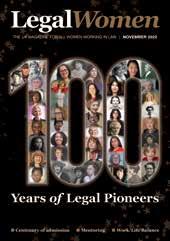
LegalWomen | 31
International
To advertise in Legal Women, please call Catherine McCarthy our Business Features Editor on 0151 236 4141 or email catherine@ benhampublishing.com Would you like to feature in Legal Women?
Celebrating 100 years of Women Solicitors in England & Wales
The return of in-person events meant that the centenary of women entering the profession was celebrated at Macfarlanes law firm. The photos above are from Legal Women’s own event, held with the support of Macfarlanes. Lubna Shuja spoke about the challenges that faced women over the last 100 years and how things have changed. There was also an event at The Law Society of England and Wales which Serena Reynell attended and reports on here:
The event welcomed a wide range of guests and speakers, including the Law Society President, Lubna Shuja, attorney General Victoria Prentis KC MP, and Dana Denis-Smith, founder of the first 100 years project.
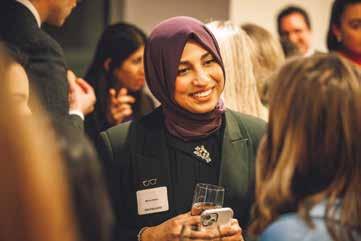
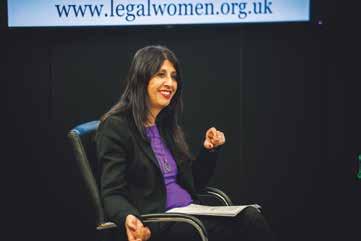
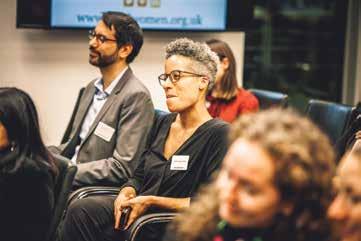
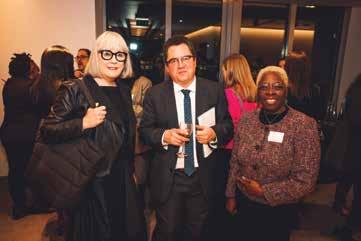
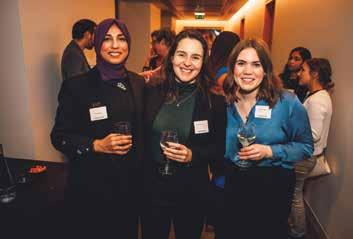
We listened to the stories of women who have blazed a trail in our profession over the years. But also discussed the sobering reality of how much more work needs to be done to achieve true parity. Currently, despite over 60% of the profession being women, only 35% of law firm partners are women. Which is just a 0.3% advance in a decade.
The first women lawyers faced unimaginable obstacles for simply demanding their human right to practice as equals. And despite it being 100 years since Carrie Morrison’s admission, we still shockingly witness terrible examples of inequality across the world, particularly in countries like Afghanistan, and Iran, where equality is going backwards. To achieve global and sustained change, western lawyers, law firms and all those working in legal practice must do all they can to support women’s causes around the world.
Dana Denis-Smith highlighted the importance of understanding the historic context of the rise of women in law, as critical to our future success. Mentors and role models for the next generations are also more critical than ever. Speakers celebrated those who continue to support young lawyers, including male champions for change, who are also crucial to the fight. Practical changes and policies need to be introduced and followed up within law firms to ensure tangible results.
To achieve equality, we must continue paving the way and holding the torch for the women behind us, as sadly, it is still estimated to take at least 100 years to achieve gender parity. But equality benefits us all; unequal societies are less cohesive, have higher rates of anti-social behaviour and violence. Whereas countries with greater gender equality are more connected, people are healthier, have better wellbeing and increased GDP. Utilising the networks we have available, through organisations like the Law Society, Bar Council, law firms and charities, we can team up globally and continue to mark important events to raise awareness, and ultimately stop the rule of law from declining and ensure gender equality is top of the agenda for all.
Serena Reynell. ■
32 | LegalWomen Events
Housing Possession Duty Desk
‘The practical guide that is so much more’ – an essential purchase for post-pandemic Britain
Housing Possession Duty Desk – A Practical Guide By Simon Mullings and Sue James. An appreciation by Elizabeth Robson Taylor MA of Richmond Green Chambers and Phillip Taylor MBE, Head of Chambers, Reviews Editor, “The Barrister” and Mediator.
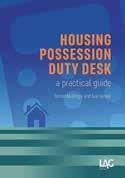
Housing repossession is quite obviously one of the prime causes of homelessness, the human consequences of which are not only horrific, but also –ironically enough – very expensive, particularly for local authorities in ways that are too numerous and complex to be listed here.
Housing law, predictably, is a continually evolving discipline which, for advisers in this area, has become increasingly complex. Fortunately, the Legal Action Group (LAG), the access to justice charity, has come to the rescue –particularly of those threatened with repossession – with clear and authoritative texts on the subject, the best known of which is ‘Defending Possession Proceedings’, which has become the definitive guide to this area of law.
But for those who provide beleaguered tenants or mortgagees with timely and pertinent advice – under strained circumstances and in a large hurry (like 20 minutes before a hearing) – LAG has produced a new title: ‘Housing Possession Duty Desk’, supported by Therium Access.
This new and certainly indispensable guide is aimed at ‘those on the frontline of defending possession proceedings’, namely duty advisers, whether new or experienced, who are ‘faced with the challenge of keeping a roof over peoples’ heads,’ usually at the very door of the court.
The publication of this book is undeniably timely in the time of pandemic and its aftermath, when threats of repossession are reaching record levels. Writing in the foreword, Knowles J points out that ‘there are many, many thousands of possession cases,’ adding that ‘It is too easy to create a conveyor belt, to base assumptions on inferences.’
‘In a fairer system’, write authors Sue James and Simon Mullings, ‘this book might not need to exist.’ In the meantime, tenants and borrowers need help, which is amply provided with erudition and precision in this book, which – in the words of Knowles J – is so much more than a practical guide.
Rather, it is an essential reference, not only for duty advisers, but barristers, solicitors, legal professionals and indeed anyone representing a tenant or mortgagee facing repossession in these difficult times. ■
Legal Action Group – The access to justice charity www.lag.org.uk
Family Law leaves the EU
A summary guide for Practitioners
An
appreciation by Elizabeth Robson Taylor MA of Richmond Green Chambers and Phillip Taylor MBE, Head of Chambers, Reviews Editor, “The Barrister”, and Mediator.
This new guide from the Family Law imprint of LexisNexis is most welcome at a time when so much confusion reigns in the world caused by the coronavirus pandemic. Any practitioner who is faced with trying to understand where we will be with family law matters on leaving the European Union on the last day of 2020 will be relieved to read this innovative sort work from Professor David Hodson OBE. We welcome the important additional section on public child law written by Maria Murphy for those specialists involved with local authorities.
We feel that this short paperback will be highly relevant to all family law practitioners as a quick accessible guide to the law and practice which will apply on the UK’s final departure from the EU on 31 December 2020. The government has indicated that the UK will not be party to any further EU laws from January 2021, instead relying on existing international laws such as the Hague Convention, to which we will be a party in our own right.
There will also be new provisions to cover issues of national law, where previously EU law existed. Inevitably, some court procedures will need to change once the final break with Europe has taken place. This invaluable title gives us an overview of the legal position and the practical issues which are judged to arise in all areas of family law, including the preparatory steps which lawyers should take in readiness for departure, to advise clients as effectively as possible in the future.
The key topics cover the main substantive family law areas depending on what you are looking for: the governing laws; divorce; financial aspects including remedies; the Hague Convention 2007; the Lugano Convention; private children law; public children law; domestic violence; the service and the taking of evidence, Alternative Dispute Resolution (ADR), and legal aid; and potential areas of EU/UK future co-operation in the post-Brexit era.
When we woke up early on that morning of Friday 24th June 2016, many of us were looking at a most uncertain future. Hodson’s “Family Law Leaves the EU” bridges an important gap for family law practitioners as we grapple with the post-Brexit era whilst fighting a world pandemic.
Family Law leaves the EU: A summary guide for Practitioners is available now from www.lexisnexis.co.uk ■
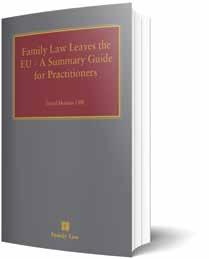
LegalWomen | 33 Book Review
Poppy’s second chance at love
Poppy’s owner first contacted her local rehoming centre and said she needed to hand Poppy, a four year old Chihuahua cross, over to us as she had sadly recently been given a diagnosis that she had a terminal illness. She was advised to apply for a free Canine Care Card and nominate a Dog Guardian; someone she trusts to sign over the care of Poppy to Dogs Trust should she need it. She’d then be able to spend the most time possible with Poppy and feel reassured that she’d be given the best possible care at Dogs Trust when they could no longer be together.
When Poppy’s Dog Guardian contacted us to advise that her owner was now receiving palliative care and that they needed to activate her Canine Care Card, Poppy was collected by Dogs Trust the very next day. After a vet and behavioural assessment we decided the best place for Poppy would be a loving foster home. We were able to advise the foster carers of all the information we’d been given by Poppy’s owner regarding her life, diet and routine to enable us to make this transitional period as stress-free as possible for Poppy.
Within almost no time, we were able to find very affectionate Poppy a lovely new home for her second chance at love.
Poppy’s story is one of many we come across at Dogs Trust.
Many owners are growing increasingly worried about gradually losing their independence or their health deteriorating. Dogs Trust want to offer owners peace of mind that we will be there at this difficult time to care for and rehome their four legged friends should the worst happen.
Therefore we’re pleased to announce that we have extended our Canine Care Card service. Dogs Trust will care for your dog should you move into a care home, become seriously ill or pass away.


For more information on our Canine Care Card service and how to register your dog please type in this link www.dogstrust.org.uk/ccc where you will find our online application form and more information on our free service.
If you have any queries regarding the Canine Care Card please email CCC@dogstrust.org.uk or call 020 7837 0006 and we will be happy to help. ■
Who’ll keep her happy when
34 | LegalWomen Advertisement Feature We will – as long as your client has a Canine Care Card. It’s a FREE service from Dogs Trust that guarantees their dog a second chance a life. At Dogs Trust, we never put down a healthy dog. We’ll care for them at one of our 21 rehoming centres, located around the UK. One in every four of your clients has a canine companion. Naturally they’ll want to make provision for their faithful friend. And now you can help them at absolutely no cost. So contact us today for your FREE pack of Canine Care Card leaflets – and make a dog-lover happy. E-mail ccc@dogstrust.org.uk Or call 020 7837 0006 Or write to: FREEPOST DOGSTRUSTL (No stamp required) Please quote “334975”
your client’s
All information will be treated as strictly confidential. Service only available for residents of the UK, Ireland, Channel Islands & Isle of Man. A dog is for life, not just for Christmas® dogstrust.org.uk Registered charity numbers: 227523 & SC037843 © Dogs Trust 2021
gone?



Xxxxxxxxxxxxxxxxxxxxxx LEAP offers cutting-edge, integrated legal technology expanding beyond traditional practice management software. Visit: leap.co.uk PracticeManagement L e gal Publishing DocumentAssembly & Management LegalAccounti n g The Legal Practice Productivity Solution









 Molly Bellamy
Molly Bellamy

































 Eileen Donaghey Consultant Donaghey and Chance
Eileen Donaghey Consultant Donaghey and Chance
















































